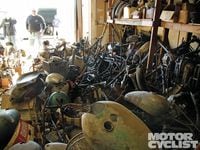Pawn Stars. Storage Wars. American Pickers. The American public has discovered the vicarious thrills of modern treasure hunting via these popular television shows. And legions of amateurs are even now scouring the country’s flea markets, pawn shops and classified ads for the motherlode in a postmodern treasure hunt.
Whether you’re hustling motorcycles, antique clocks or Beanie Babies, the basic principles of flipping merchandise are the same: buy low, sell high. I recently spoke at length with a professional motorcycle flipper, a guy who operates on the fringes of the bike market and turns piles of rust into piles of cash. According to The Flipper, the TV shows are not telling the whole truth. He set me straight on a number of things.
First thing: The profit markup is not the 20-50 percent that you see on the shows. It’s bigger: 200-500 percent. The attraction of flipping is the big rewards. If you do it right, you can triple or quadruple your money on a bike in mere weeks. If you can only make a few hundred bucks on a thousand dollar fixer, don’t bother. Leave the tedious carburetor overhauls and electrical troubleshooting hassles for an amateur who values his time less.
The Flipper recently bought an 11,000-mile 2001 Suzuki SV650 for $600. The battery was dead, so the seller couldn’t start it. The tires were shot, and it sat parked on a San Francisco street. But it was a steal. Forty minutes after the purchase, The Flipper had installed a spare battery, added fresh gas and was test riding it. Within two months, it was sold for $2700, almost five times its purchase price. No stock market investment can touch that rate of return.
Sale prices for used bikes and parts are largely fixed. When flipping, you make your money on the buying side. You have to pay as little as possible for bikes. Buying prices depend on the bike’s condition, the seller’s financial state, his current mood, and other fuzzy factors. Your best bet at increasing your margins is to make an offer just north of “insulting.” That means unrepentantly beating up the seller. So, if the seller doesn’t have a pained expression after your offer, you probably left some money on the table. Most people don’t have the heart or negotiating skills for this part, which is why there are so few pro flippers.
Buys can take time. The price will drop the longer any given bike sits in the guy’s garage. One rare European dirt bike took The Flipper six months to acquire. The ad asked $2500 for a Ducati-powered Cagiva Elefant with a lost title. After five phone calls and seven months, The Flipper acquired it for a more reasonable $750—and then turned it into $3000 in parts in four weeks.
Flipping can be a dirty business. Some of the occupational hazards are not TV-friendly. For example, consider the deer-impacted GSX-R racebike replica The Flipper bought for $1000. It had an Öhlins shock, billet rearsets, a good engine, and $1500 worth of other racing parts showing. But it also had the animal's entrails splattered across the bike. The Flipper bought a crashed MV Agusta Brutale for $1500. After paying in cash, collecting a bill of sale and driving 100 miles home, the seller called the next day with a confession to The Flipper. "I'm declaring bankruptcy, and I still owe the finance company for the bike. Their repo man wants it back." What would you do?
The Flipper has his rules. He’s never once paid the asking price for a bike; sellers always leave some margin to be talked down. If you don’t beat them up, it will cost you money. Also: if in doubt, walk away. It’s better to lose out on a purchase that’s too expensive or might have hidden issues. There are always more bikes out there and it’s better to bail on a sale that doesn’t give you the warm fuzzies.
So, the next time you run screaming out of your house after work on the way to secure a barn-find Vincent treasure for $500, don’t be surprised to see The Flipper heading the other way with the bike already in the back of his truck.












/cloudfront-us-east-1.images.arcpublishing.com/octane/QSTCM6AVEZA5JJBUXNIQ3DSOF4.jpg)
/cloudfront-us-east-1.images.arcpublishing.com/octane/U4I7G625B5DMLF2DVIJDFZVV6M.jpg)
/cloudfront-us-east-1.images.arcpublishing.com/octane/B6XD6LS6IVCQPIU6HXDJSM3FHY.jpg)
/cloudfront-us-east-1.images.arcpublishing.com/octane/ICL63FEDDRDTTMINYICCEYGMDA.jpg)
/cloudfront-us-east-1.images.arcpublishing.com/octane/FCGZHQXRBZFLBAPC5SDIQLVF4I.jpg)
/cloudfront-us-east-1.images.arcpublishing.com/octane/WNOB6LDOIFFHJKPSVIWDYUGOPM.jpg)

/cloudfront-us-east-1.images.arcpublishing.com/octane/X33NU3E525ECRHXLNUJN2FTRKI.jpg)
/cloudfront-us-east-1.images.arcpublishing.com/octane/6KKT5NNL2JAVBOXMZYS5ZO76YA.jpg)
/cloudfront-us-east-1.images.arcpublishing.com/octane/J5RKG5O455GMPGQRF2OG6LRT7A.jpg)
/cloudfront-us-east-1.images.arcpublishing.com/octane/GX2CIZKQVRH2TATDM26KFG2DAE.jpg)
/cloudfront-us-east-1.images.arcpublishing.com/octane/ZWIDYSAKQZHD5BHREMQILXJCGM.jpg)
/cloudfront-us-east-1.images.arcpublishing.com/octane/CYUHJZCTSJCH3MRAQEIKXK7SCQ.jpg)
/cloudfront-us-east-1.images.arcpublishing.com/octane/LKOFINY56FCXJCANJ5M7ZDQUBY.jpg)
/cloudfront-us-east-1.images.arcpublishing.com/octane/4NBPDACMWJH63JQYJVK3QRBDZI.jpg)
/cloudfront-us-east-1.images.arcpublishing.com/octane/KKHQHRR3FJGX7H2IPU6RALMWG4.jpg)

/cloudfront-us-east-1.images.arcpublishing.com/octane/5IOFS5JAE5FOXMNA23ZRAVVYUU.jpg)
/cloudfront-us-east-1.images.arcpublishing.com/octane/CGXQ3O2VVJF7PGTYR3QICTLDLM.jpg)

/cloudfront-us-east-1.images.arcpublishing.com/octane/OQVCJOABCFC5NBEF2KIGRCV3XA.jpg)
/cloudfront-us-east-1.images.arcpublishing.com/octane/OPVQ7R4EFNCLRDPSQT4FBZCS2A.jpg)
/cloudfront-us-east-1.images.arcpublishing.com/octane/YBPFZBTAS5FJJBKOWC57QGEFDM.jpg)
/cloudfront-us-east-1.images.arcpublishing.com/octane/W5DVCJVUQVHZTN2DNYLI2UYW5U.jpg)